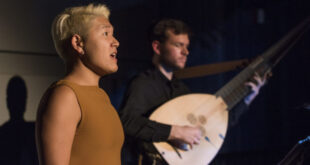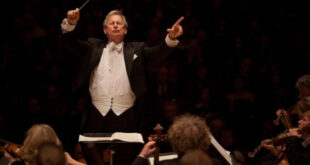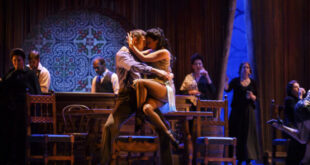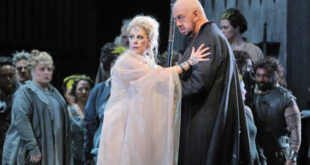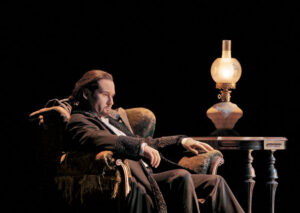 “Dramma giocoso.” That’s what the man said.
“Dramma giocoso.” That’s what the man said.
We have noted previously that Mozart’s “Don Giovanni” is the “Hamlet” of opera, meaning that there has been more criticism and analysis of this work than any other of its kind. And most of the writing stems from this “dramma giocoso” deal. Literally translated it’s a paradoxical phrase. “Dramma” means serious or tragic and “giocoso” means comical or funny. Italian playwright and librettist Carlo Goldoni coined the term in the mid-18th Century for works of his that had character types from both “opera seria” (tragic, or serious opera) and “opera buffa” (comic opera) in the same work. “Don Giovanni” definitely falls into this category. Yet critics and analysts can’t agree on whether the opera is actually a tragedy with comic overtones or a comedy with tragic overtones. I personally believe one would be best to leave the whole thing up to the enjoyment of perhaps Mozart’s greatest music.
There are eight–count ’em, eight–of what you might call principal vocal roles in this opera. And it’s a long one, dare we say, of Wagnerian proportions–certainly far longer than any other master composer of Italian opera ever wrote. Four of the roles are clearly from “opera seria,” three are definitely the “buffa” type and one–the most important one–is both at different times.
In terms of “dramma giocoso,” Don Giovanni is AC/DC. There is absolutely nothing funny about his violent behavior–killing Donna Anna’s father while trying to rape her or being dragged down to hell for his sins, for example. On the other hand, with his extended banter with Leporello in the many long “recitativo secco” passages, and his interactions (even in otherwise serious ensembles) with Donna Elvira, he is also very funny. Baritone Mariusz Kwiecen handled the tile role masterfully, capturing both sides of the enigmatic profligate. And when he sang his part in the duet, “La ci darem la mano” and his Act II serenade “Deh vieni alla finestra” with such ease and suavity, he showed what a fine singer he is.
The best voice of the cast belonged to the audience’s favorite, soprano Marina Rebeka, as Donna Anna. This part requires a solid, powerful voice to put the role across, but it does NOT always have to be a Brünnhilde type. Ms Rebeka probably could sing that stuff if she wanted to–her voice is that big–but now, I’m happy to say, she’s doing roles such as Violetta. In this performance EVERYTHING she did–solo arias such as “Non mi dir” and the lead parts of the ensembles–proved nothing short of sensational.
The “seconda donna,” or the soprano who sings Donna Elvira, is not expected to be the equal vocally of the Donna Anna, and that is that case with Lyric’s Anna Maria Martinez. Nevertheless she did a fine job on her solo arias, “Ah, chi mi dici mai,” “Ah, fuggi il traditor” and “Mi tradi quell’alma ingrati.”
From his first “Notte e giorno faticar” I knew that baritone Kyle Ketelsen was going to be an excellent Leporello. He handled all his ensemble parts beautifully, acted superbly and brought a smile to my lips when he carried on the tradition begun by Luigi Lablache in the 1830s, humming at the end of his very well sung “Madamina.”
Poor Don Ottavio has come in for more criticism over the years than any other character in this opera. And as far as his part written by da Ponte goes, I’m afraid it’s deserved. But Mozart’s music for him is … well … it’s Mozart and it’s gorgeous and technically very demanding. As a matter of fact, the original solo aria “Il mio tesoro” of Act II, premiered in Prague, was too difficult for the tenor cast for the Vienna run. So Mozart had to compose another, “Dalla sua pace,” which he placed in the first act. Today the custom is for tenors to sing BOTH arias and Lyric’s Antonio Poli did not disappoint. He was also very strong in the many ensembles.
Our Zerlina was sung to perfection by Lyric soprano Andriana Chuchman. She achieved just the right blend of innocence and seductiveness in “La ci darem la mano” and did an excellent job on her two solo arias, “Batti, batti, o bel Masetto” and “Vedrai carino.”
Originally, the Commendatore and Masetto were always sung by the same bass. But the two roles have been split up for two singers for I don’t know how long. Lyric’s Andrea Silvestrelli is a REAL bass! It was thrilling to hear him sing in the opera’s opening, the few words in the cemetery scene and the scene where Don Giovanni goes to hell.
Baritone Michael Sumuel made the most of the part of Masetto, who is always getting shoved aside or beaten up. (At least he gets to be nursed in a sexy way by Zerlina!) But in his short solo aria, “Ho capito,” one could tell that he has a good voice and technique and should get even better with more experience.
For me the real musical star of this production was Sir Andrew Davis. His most remarkable achievement was keeping the energy level up with the singers and the fine musicians throughout the entire lengthy performance. While we’re on the subject of musicians, a special nod to cellist Calurn Cook for some brilliant solo work on “Batti, batti.”
 Fra Noi Embrace Your Inner Italian
Fra Noi Embrace Your Inner Italian


